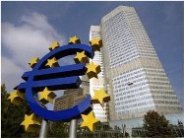European central banks cut rates to ward off recession
 London/Frankfurt - Faced with a looming recession and rapidly falling inflation, Europe's leading central banks delivered hefty rate cuts Thursday as monetary authorities around the world stepped up efforts to trim the cost of money.
London/Frankfurt - Faced with a looming recession and rapidly falling inflation, Europe's leading central banks delivered hefty rate cuts Thursday as monetary authorities around the world stepped up efforts to trim the cost of money.
While the European Central Bank (ECB) meeting in Frankfurt lopped 50 basis points off its benchmark refinancing rate, the Bank of England meeting in London announced a more dramatic 150-basis-point reduction.
Thursday's cuts in borrowing costs brought the rates in the 15-member eurozone down to 3.25 per cent and to 3 per cent in Britain with analysts expecting both banks to follow up Thursday's moves with more reductions in the coming months.
"I don't exclude we could cut rates again," ECB chief Jean-Claude Trichet told a press conference Thursday following the meeting of the ECB's 21-head rate-setting council.
The ECB chief said the financial crisis was "broadening and intensifying" and was likely to dampen economic activity around the world and in the eurozone for a protracted period.
At the same time, he also saw the financial crisis undercutting inflation amid renewed talk of the growing risk of deflation. Only three months ago, the ECB was warning about the inflationary threat posed by surging energy costs.
Moreover, the BoE's more-than-forecast reduction in the cost of money again served to highlight the scale of the economic threats facing Britain with the most aggressive interest rate forecasts for the British central bank calling for a 100-basis-point cut.
While welcoming the BoE cut, Graeme Leach, chief economist at Britain's Institute of Directors said: "The reduction shows that the (BoE's) monetary policy committee think inflation is yesterday's story and deflation is the risk for tomorrow."
The London-based central bank said in a statement that Britain had seen a "substantial downward shift in the prospects for inflation" in the past two months and commodity prices had fallen sharply.
At the same time, the BoE said there had been a "very marked deterioration in the outlook for economic activity at home and abroad."
Speaking at his press conference, Trichet said that the ECB's governing council had considered delivering a more dramatic 75 basis points Thursday but had unanimously agreed to the 50 basis points reduction.
He also went on to say that so far there was no evidence that the US mortgage market meltdown had resulted in a tightening of credit markets in the eurozone as they had in other parts of the world. "We see no credit crunch," Trichet said.
Both the ECB and the BoE last cut rates four weeks ago as part of a coordinated move by the world's leading central banks aimed at shoring up economic and financial confidence.
The global drive to lower rates also forms part of the build-up to a meeting of European Union leaders in Brussels Friday and a larger gathering of the Group of 20 government chiefs in Washington in a week to discuss measures for dealing with the global financial crisis.
This week's ECB and BoE reductions also come in the wake of a new wave of rate cuts around the world lead by the US Federal Reserve and the Bank of Japan.
The monetary authorities in Norway, Slovakia, the Czech Republic, South Korea, Taiwan, Israel and China have also recently reduced the cost of money in the run-up to Thursday's BoE's nine-member monetary committee meeting in London and the ECB's governing council gathering in Frankfurt.
On Tuesday, Australia's Reserve Bank delivered its third rate cut in as many months slashing rates by a hefty 75 basis points.
More to the point, the gloomy global economic outlook and falling inflation is giving the central banks around the world room to move on borrowing costs.
Eurozone inflation slipped to 3.2 per cent in October from 3.6 per cent in September on falling oil prices, preliminary data released last week showed with business confidence in the currency bloc plunging to a 15-year low.
Currently at over 4 per cent, inflation in Britain is expected to tail-off in line with the falling oil price, the dual target of stimulating the flagging economy and supporting a crumbling housing market has taken priority in the British debate. (dpa)